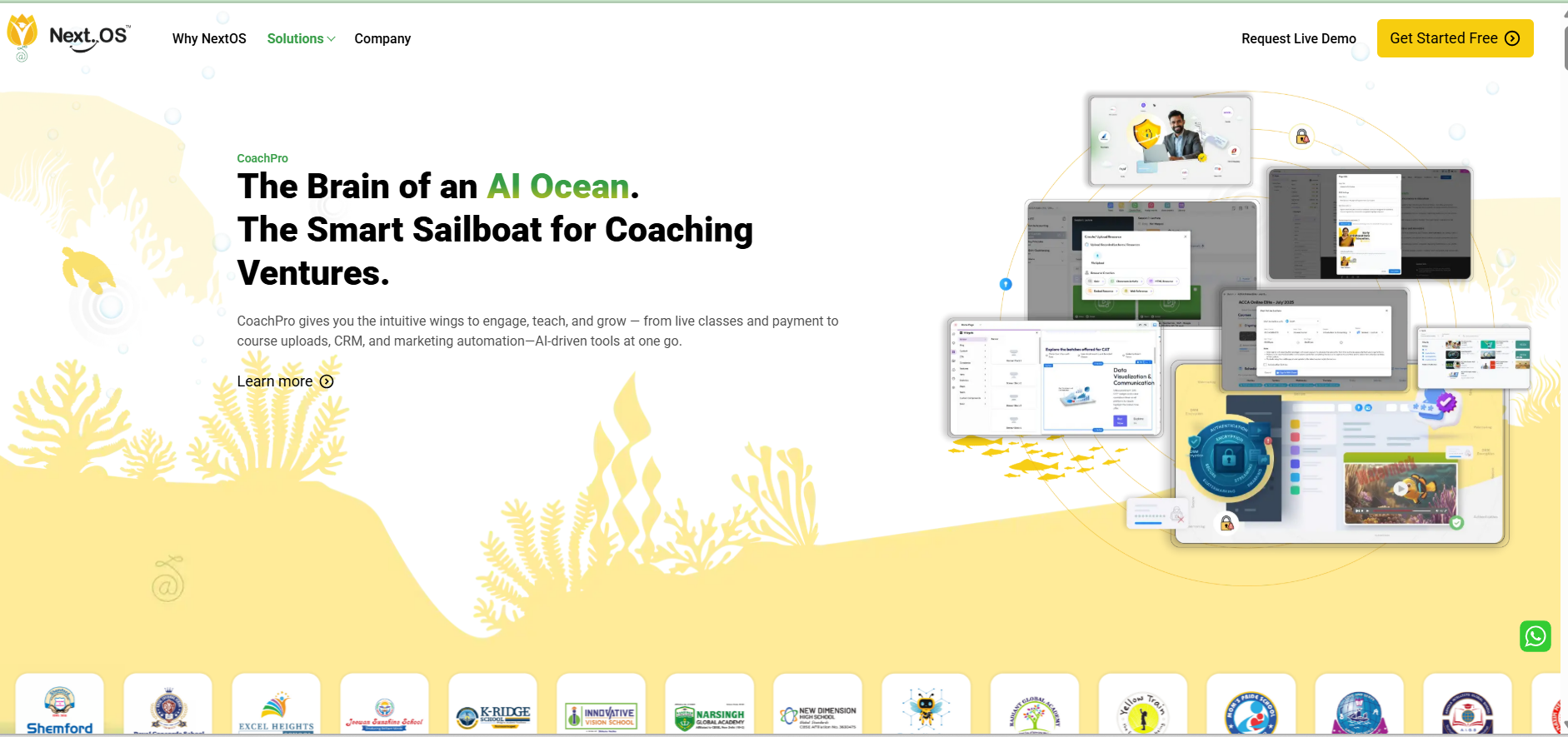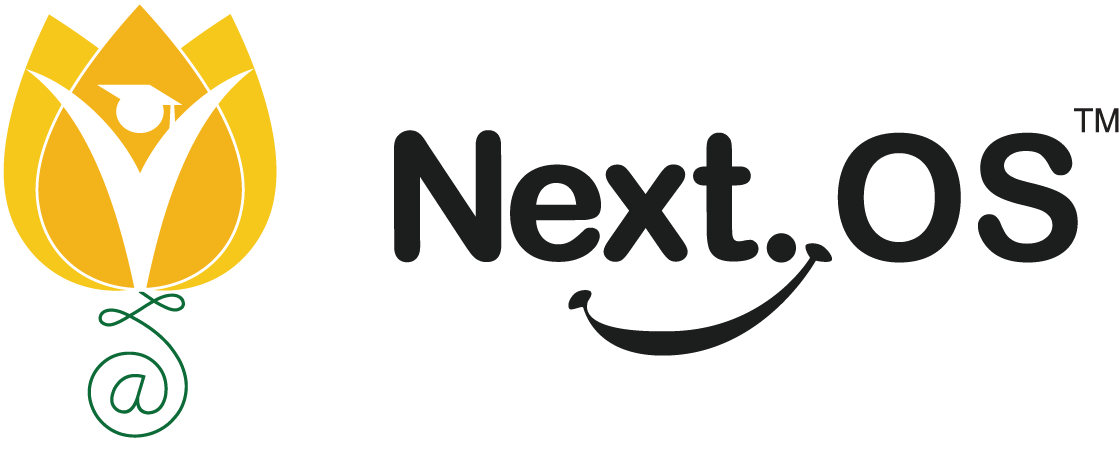Education is becoming increasingly digital, and Online Coaching Platforms in India are empowering teachers and educators with advanced tools to deliver better learning experiences. Whether you manage UPSC, IIT, NEET, or banking exam coaching—or want to upgrade your institute’s teaching approach—selecting the right online platform is essential. With numerous options available, choosing the one that truly fits your institution’s needs can be challenging.
This guide provides an unbiased overview of the top platforms, highlights essential features, and offers a clear framework to help you choose the best solution for your coaching institute.
A Quick Comparison of Online Coaching Platforms
Here’s a brief overview of the platforms we’ll cover.
| Platform | Best For | Key Feature | Pricing Model |
| NextOS | Coaches & educators of all sizes | All-in-one coaching, scheduling, and monetisation tools | Subscription-based |
| Teachable | Course creators & entrepreneurs | Easy course creation & sales tools | Subscription-based |
| Thinkific | Independent educators | Customizable courses and website builder | Free & Paid Plans |
| Kajabi | Digital businesses | All-inclusive platform for marketing & courses | Subscription-based |
| Podia | Digital products & communities | Courses, downloads, and membership tools | Subscription-based |
| Moodle | Institutions & large organisations | Highly customizable open-source LMS | Free & Self-hosted |
| LearnWorlds | Interactive learning experiences | Advanced analytics & interactive video | Subscription-based |
| Classplus | Independent tutors & institutes | White-label coaching app creation | Subscription/SaaS |
| Graphy | Indian creators & educators | Course selling, memberships, and a mobile app | Subscription-based |
How to Evaluate Online Coaching Platforms
It’s crucial to understand what to look for in a virtual coaching platform before selecting a specific platform. Your choice depends on whether you are a learner or an educator looking to sell courses online in India. Here are the basic features to evaluate.
- Content & Live Class Support: Can the platform accommodate various types of content, including pre-recorded videos, PDFs, and assignments? For educators, do they have robust live class platforms with features like whiteboards, screen sharing, and recording?
- Payment & Settlements: The platform must support Indian payment methods like UPI, net banking, Paytm, and credit/debit cards. Verify that your coaching service provider offers automated payment collection, transparent fee structures, and timely settlements into your bank account. The ability to generate GST-compliant invoices is a major plus.
- Mobile Experience: Many users in India use smartphones to access content. A simple, easy-to-use mobile app for Android and iOS is essential for both learning and teaching. An accessible interface helps everyone learn better.
- Analytics & Reporting: Data is essential. Good platforms show you how students engage, how they perform on tests, and how much revenue you earn. Learners also benefit from tracking their progress and seeing their results.
- Marketing & Sales Tools: If you want to sell courses, you need tools to reach your audience. Look for features such as making coupons, using affiliate marketing, and building landing pages to help you succeed.
- Compliance & Data Privacy: The platform must follow Indian data privacy laws. Your information and your students’ data should always be safe.
Detailed Platform Profiles
1. CoachPro (NextOS)
 CoachPro is an online coaching platform created by Next Education, led by CEO Beas Dev Ralhan. Founded in 2007, the company developed CoachPro as part of the NextOS ecosystem, an AI-powered solution that enables coaching and training institutes to offer interactive courses nationwide.
CoachPro is an online coaching platform created by Next Education, led by CEO Beas Dev Ralhan. Founded in 2007, the company developed CoachPro as part of the NextOS ecosystem, an AI-powered solution that enables coaching and training institutes to offer interactive courses nationwide.
CoachPro helps boost engagement with an easy-to-use interface, live classes, course uploads, CRM, and marketing automation. It streamlines both teaching and back-office tasks by digitizing them. The platform also features a branded mobile app, allowing students to access lessons and notifications easily, wherever they are.
- CoachPro is ideal for coaching centers, independent educators, and training organizations that want an all-in-one platform to create, market, and manage their online presence. It covers everything from live classes and payments to course uploads, CRM, and marketing automation.
- Pros: The platform has an easy-to-use dashboard, reliable video streaming, built-in payment gateways, and strong analytics tools to track learner progress.
- Cons: Advanced users may find limited customization options, and some features are only available with a premium subscription.
Try it free— online coaching software.
2. Teachable
Teachable was founded in 2013 by Ankur Nagpal and is now part of Hotmart. The platform helps creators build and sell online courses. Many entrepreneurs and educators like it for its simple design and ability to grow with their needs.
Teachable offers features like quizzes and a mobile app to help keep students engaged. It works well for knowledge-based businesses, and many creators have reached impressive revenue goals using the platform. You can also customise course pages to fit your brand.
- Best for: Educators and business owners who want an easy way to launch and earn money from courses.
- Pros: Easy drag-and-drop course builder, flexible pricing, built-in payment processing, and marketing tools.
- Cons: Lower-tier plans have transaction fees, and branding options are limited unless you choose a higher plan.
Try it free— online coaching software.
3. Thinkific
Thinkific was founded in 2012 by CEO Greg Smith (and co-founders) in Vancouver, Canada. It’s a platform for building learning experiences, designed for independent educators and organisations that want flexibility in how their courses are presented and sold.
It is intended to be highly user-friendly, featuring a drag-and-drop course builder that supports various media types, including video, PDFs, and quizzes. For student engagement, the ‘Thinkific Communities’ feature is a one-way learning experience that transitions into a collaborative one. Thinkific stands out as the choice for serious educators and those prioritising a rich, structured learning environment.
- Best for: Teachers and trainers seeking a customizable, white-labelled course website
- Pros: Highly customizable course and landing page options, quiz and survey features, and a free plan for beginners
- Cons: Advanced functionality requires paid plans, and there is a learning curve for customisation
Try it free— online coaching software.
4. Kajabi
Kajabi is a digital marketing tool launched in 2010 by Kenny Rueter. The present CEO is Ahad Khan. It brings together courses, email marketing, websites, and automation in one platform.
It is primarily built for knowledge entrepreneurs. For engagement, it includes a robust course builder for online classes, membership sites, and coaching programs, an integrated website builder, powerful email marketing and marketing automation tools, and built-in sales funnels (called ‘Pipelines’) with native payment processing. They also incorporate video hosting, drip content scheduling, and quizzes to enhance educational engagement.
- Best for: Entrepreneurs who want to manage their whole digital course or coaching business from one platform.
- Pros: Strong built-in marketing tools, attractive website themes, and helpful automation workflows. Pricing and some features may be more than most educators need.
Try it free— online coaching software.
5. Podia
Podia was established in 2014 by Spencer Fry (Founder & CEO) and is an all-in-one solution that enables you to host and sell online courses, digital downloads, webinars, and paid memberships from a single, intuitive dashboard.
The platform features powerful, native email marketing tools that enable targeted communication, including built-in tools for connecting with your audience, such as a dedicated community space. Podia also has the ability to host live webinars and workshops, providing real-time interaction.
- Best for: Creators who want a straightforward solution to manage multiple digital products
- Pros: Unlimited courses, webinars, and email marketing included. It is an easy-to-use platform and has no transaction fees
- Cons: Fewer customisation options compared to Thinkific or Kajabi
Try it free— online coaching software.
6. Moodle
Moodle is one of the leading open-source learning management systems, used by universities, colleges, and organisations. It was founded in 2002 by Chairperson Martin DougiamasIt and the present CEO Scott Anderberg.
It includes powerful built-in activities such as forums, Wikis, Chats, Assignments, and Quizzes. The platform encourages active learning through Gamification elements, such as badges and Competencies, to reward achievement. Its core strength and what makes it stand out is its foundational philosophy of Social Constructionist Pedagogy.
- Best for: Educational institutions and trainers needing a highly customizable LMS
- Pros: Open-source flexibility, extensive plugin library, and strong community support
- Cons: Requires hosting and technical know-how; interface can feel dated without customisation
Try it free— online coaching software.
7. LearnWorlds
LearnWorlds was founded in 2014 by CEO & Co-Founder Panos Siozos, focusing on delivering engaging and interactive online learning experiences.
The platform also provides comprehensive white-labeling, a powerful drag-and-drop Site Builder, and strong Marketing & Sales Funnels to help creators monetise courses, bundles, and memberships. Its core features include an advanced Interactive Video Editor that allows creators to embed quizzes, buttons, and pop-ups directly into videos, along with support for SCORM, customizable Exams, and interactive eBooks.
- Best for: Educators who want interactive video, assessments, and social learning features
- Pros: Interactive video capabilities, advanced analytics, and customizable course player
- Cons: Some features are locked behind higher plans
Try it free— online coaching software.
8. Classplus
Classplus was founded in 2018 by Mukul Rustagi (CEO), Bhaswat Agarwal (Co-Founder), and others in Noida, India. It is a B2B and B2C solution that empowers independent tutors and coaching institutes to launch their own branded teaching apps.
It provides the backend infrastructures like live classes, payment collection, content hosting, and student management—so educators can focus on teaching under their own brand name. It focuses on content security (utilising SSL encryption) and its integrated Marketing Dashboard, which helps them manage their administrative load and focus on scaling their business and teaching effectively.
- Suitable For: Independent educators, tuition centres, and coaching institutes wanting to digitise their business and sell courses online in India without building an app from scratch
- Pros: Full ownership of your brand and student data. An all-in-one solution for marketing, teaching, and managing your coaching business. Supports a wide range of Indian payment methods
- Cons: It’s a SaaS product, so a subscription fee is required. Marketing your app to attract students is your own responsibility
Try it free— online coaching software.
9. Graphy
Graphy is an all-in-one, SaaS based product founded in 2020 by CEO Sumit Jain and Co-Founders Sushil Kumar and Shobhit Bakliwal in Bengaluru, India. It has a user-friendly interface with an affordable pricing model and feature-rich tools, tailored for Indian creators and educators to build, market, and sell courses under their own brand.
Key features include a no-code drag-and-drop course builder, a branded website and mobile app (for both iOS and Android), and a comprehensive suite of integrated marketing and sales funnels with tools such as affiliate programs, coupon codes, and built-in email automation.
- Suitable For: Indian educators looking for a white-labeled platform with integrated payment and marketing support
- Pros: Mobile app, website builder, webinars, and built-in Indian payment gateways
- Cons: Requires a subscription and is best suited for those who are ready to invest in building an online brand
Try it free— online coaching software.
A Note on Pricing
The cost of these platforms can vary significantly from one to another.
- Freemium or entry-level options: Some platforms, such as Thinkific, offer a free version with basic features. This makes it easier for new tutors to get started.
- Subscription for tutors: SaaS platforms such as NextOS and Classplus usually charge educators a monthly or yearly fee to use their services. The price often depends on the number of students you have or the features you need.
- Subscription for learners: Aggregator platforms employ a subscription model, where students pay a regular fee to access a curated collection of courses or content.
- Per-Course/Program: Some platforms may charge on a per-course basis. Always check the most recent pricing, as it is subject to change. Be aware of transaction fees and any other hidden costs. Be aware of sales or other hidden costs.
How to Choose the Right Platform in 4 Steps
- Define Your Goal: Are you a learner or a teacher? If you’re a teacher, do you want to build your own brand or join an existing platform? If you’re a learner, what is your learning objective—academic, test prep, or professional?
- Assess Your Technical Needs: Do you need advanced live class platforms with interactive whiteboards? What kind of content will you create or consume? Do you need a powerful mobile app?
- Evaluate Your Budget: As a learner, determine what you can afford to spend. As an educator, calculate the return on investment. A free platform might seem appealing, but a paid one with better marketing tools could generate more revenue in the long run.
- Request a Demo or Trial: Most SaaS platforms for educators offer demos or trials. For learning platforms, consider exploring free classes or introductory content to gauge the user experience and teaching quality before committing.




No Comment